SUMMARY
This is AI generated summarization, which may have errors. For context, always refer to the full article.
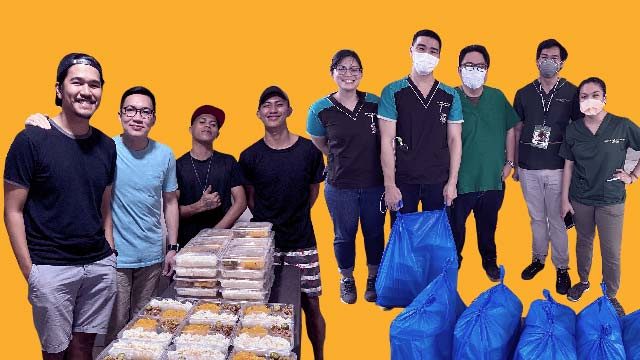

MANILA, Philippines – When the government first announced that it would be placing Metro Manila on community quarantine to deal with the coronavirus pandemic, grad student Louis Banzon, felt the wave of panic and anxiety that hit Filipinos through social media.
Scrolling through Facebook was like going through a swamp of toxicity as he saw people panic-buying, hoarding, and spreading unverified news and information. Through all that, he also saw calls for help from medical frontliners and minimum wage earners — the people most vulnerable to the coronavirus crisis.
He saw their calls for help as a call to action.
“That feeling of helplessness and frustration, of just sitting around the house, and doing nothing while the world is burning really made me think of a way how to help concretely,” he said.
His entrepreneurial background kicked in: “I was immediately concerned by how this quarantine would affect the economy, especially small businesses and their workers with no sales or revenue for the whole quarantine period. I felt devastated.”
Keeping small businesses in mind, he came up with an idea, something that he felt would help keep a business stay afloat, while also helping medical workers at the frontlines of the crisis.
He would pool funds from people who want to help and can pledge even a minimal amount. The funds would be used to buy goods from a small business affected by the quarantine. The goods would then be given to healthcare workers on the frontline. Donations would be done online, and by batches.
Friends first
With his idea in mind, Louis immediately called his friend, Gab Viernes, who own’s Par’s Street Sisig, a small food business in Quezon City. He asked Gab if his business could accommodate the preparation of food packs for donation. He said he would take care of raising the funds.
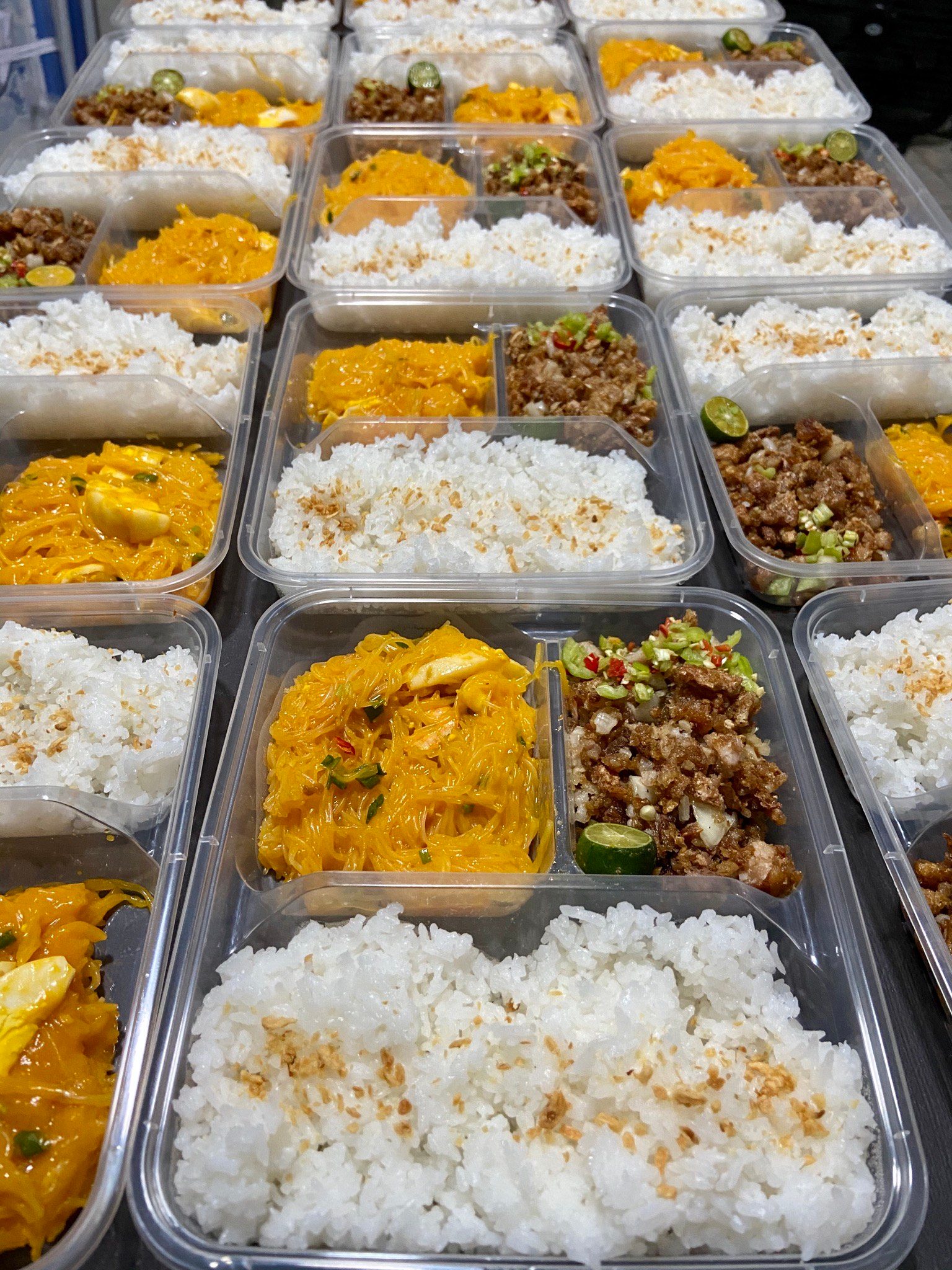
As soon as Gab was on board, Louis shared his idea to the rest of their barkada.
“Why our barkada? Because I knew that everyone in our group was willing to help,” he said.
It was also through his network and through social media, that they were able to find beneficiaries.
“We reached out to a lot of friends and batchmates who are doctors currently deployed in hospitals. We created an FB group chat, named it Ateneo High School Bayanihan and from there they instantly connected us to the contact persons of their respective hospitals,” he shared.
“All that was needed was a phone call or text message. It was a collective effort from everyone,” he said, sharing that the stories they heard from their friends on the frontlines pushed them even more to see the initiative through. “It was the least we could do for them.”
Setting the price at P150/ food pack, Louis and his friends managed to raise an initial P16,500 – which meant 110 meals for frontliners. Each meal included sisig, rice, a side of palabok, and a drink.
It had only been a day but they did everything in a rush because at the time, the enhanced community quarantine was announced and they knew things would be more difficult afterwards.
“When we completed the amount from the first fundraising, Gab and his staff readily prepared the food packs for delivery and we connected to a beneficiary hospital,” he said. They were able to successfully make their first donation to QC General Hospital on March 16 – the night before the enhanced community quarantine was imposed.
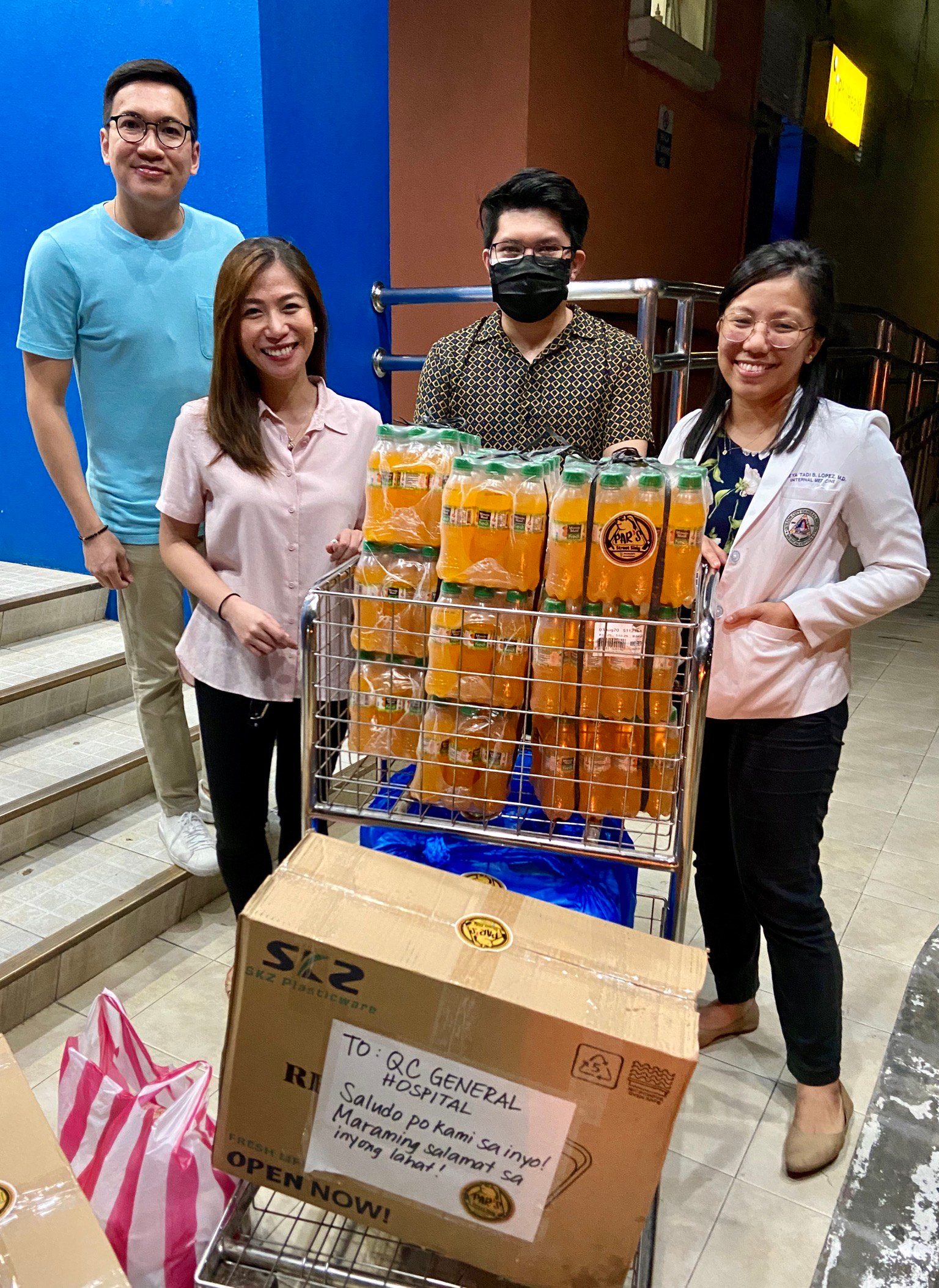
Success story
It’s only been a little over a week since their barkada made the first donation, but since then, they’ve raised around P100,000, and delivered food to 11 different hospitals, prioritizing those that might fall under people’s radars.
The amount and the response from people surprised Louis. After all, it started out as a small barkada effort.
“We are surprised that indeed a lot of people really want to help. This crisis really brought everyone together,” he said.
“Also, I think a lot of people are willing to help or donate because this health crisis is affecting everyone especially people who are close to us – friends and family members who are frontliners and are in the thick of the battle. So that made raising the funds easier,” he said. “There was no small amount because it came from the heart of people.”
For Gab, the initiative has helped his business significantly. He shared that even before the lockdown, he had already projected a dip in sales, and was worried about how he would afford to pay the salaries of his staff of 5.
The fundraiser provided a solution to that problem, and even allowed him to hire two additional kitchen workers.
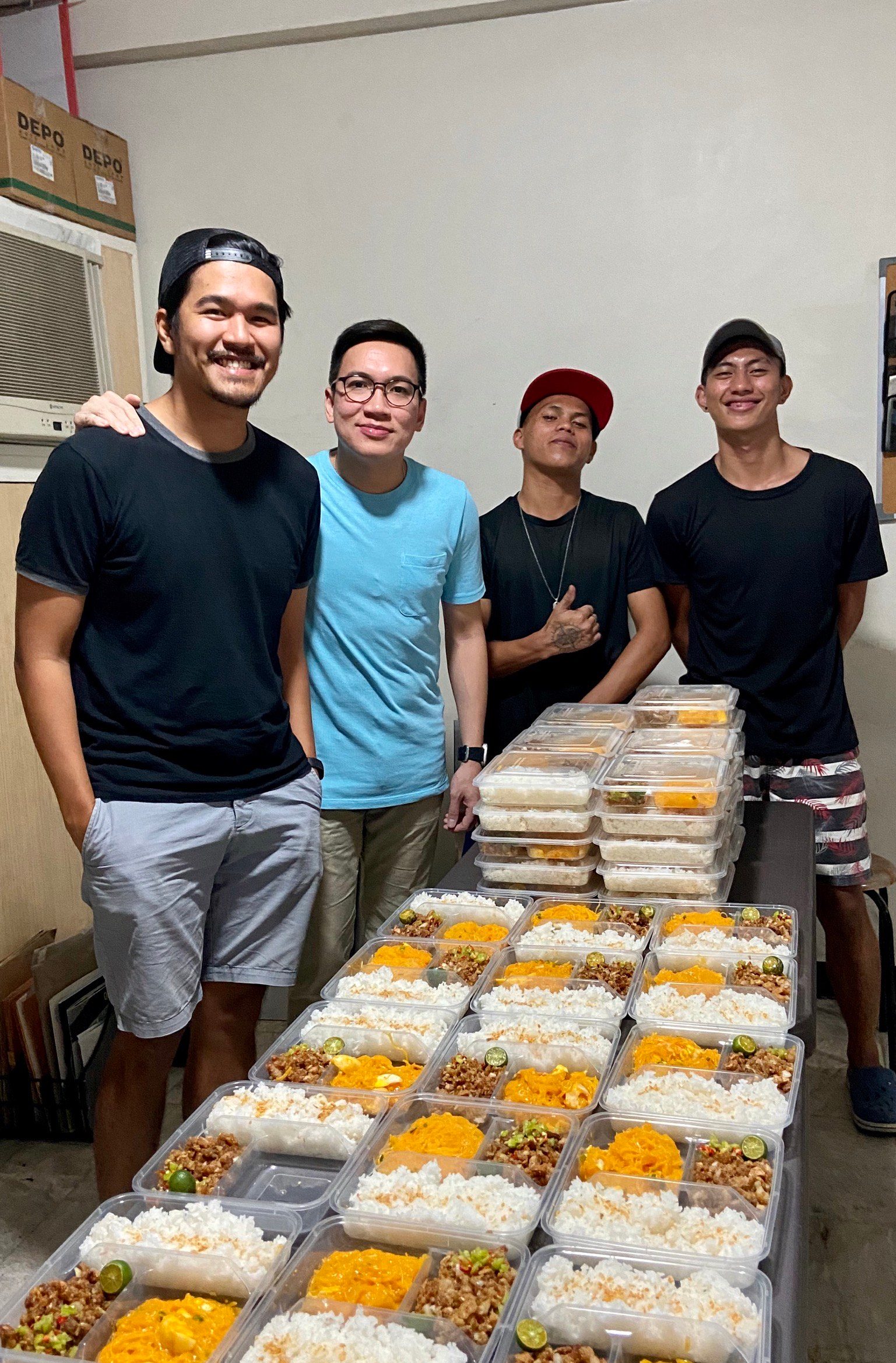
“Not only were we able to secure salaries for my current employees…we were also able to provide an opportunity for others to earn at this very trying time for laborers,” he said. At the same time, their food suppliers are also able to have continued sales.
Challenges
As one can imagine, it can’t be easy to move batches of food at a time when there are checkpoints everywhere – and as Gab shared, that was one of the challenges that they faced when it came to making this initiative happen.
“Since food supplies became limited and it was virtually impossible for most suppliers to deliver, we had to be resourceful in acquiring the different food supplies,” he said.
At some point, this meant having to meet their suppliers at checkpoints to pick up goods. They also turned to their local barangay officials to secure a certification for them to easier access the nearest local market. Lately, they’ve also been receiving raw supplies – veggies and meat – from friends who’ve heard of the initiative.
It came down to a group effort once again when the food was ready to be delivered. Their friends who are doctors or work at hospitals volunteered to pick up and deliver the donations, since they are able to move through checkpoints with more ease.
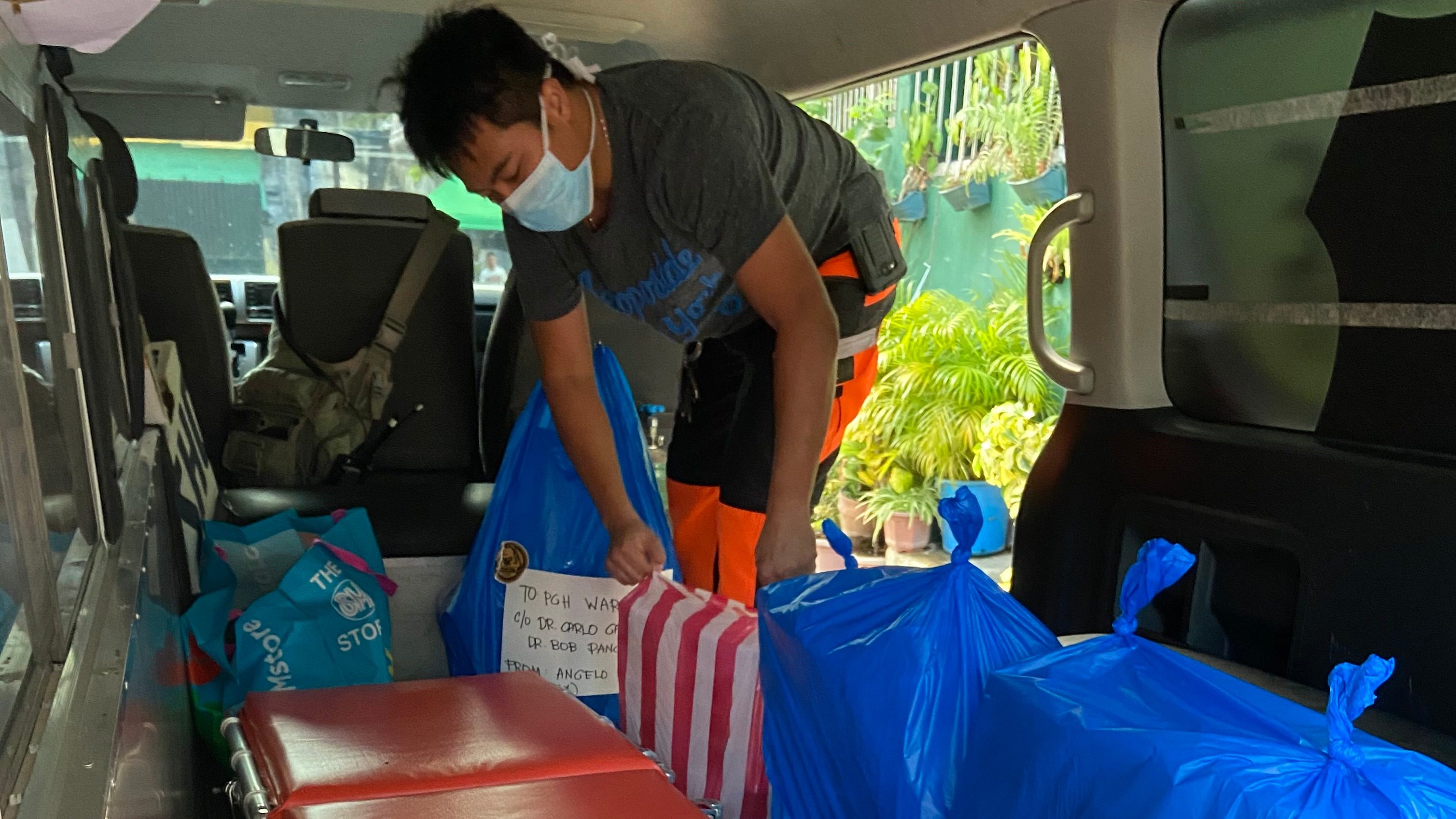
“More recently, a friend who has an ambulance offered to utilize his services in transporting the food allocations to the health institutions,” he shared.
‘Heart-warming’
Louis shared that the response they’ve gotten from frontliners was “very heartwarming,” and that their small initiative gave him the opportunity to make new friends.
“Just a simple food donation really uplifts their spirits at this time,” he said. Ultimately though, he said it’s a small contribution, and it’s the frontliners who should be applauded.
“They are facing a life or death battle for us. We also want to make them feel that they are not alone on this one,” he said. “This war is only beginning, like the 1st quarter of a basketball game and the score is not in our favor. It’s a long way to go.”
He mentioned the possibility that donations might dry up in a few weeks, and that the medical frontliners might end up lacking the resources they need – from food, to personal protective equipment.
“That’s why we are hoping that others can replicate what we did, to sustain our frontliners in the coming weeks,” he said.

How to do it
Here are a few things to keep in mind for those who want to do what they did:
1. Start with your network
We indeed get by with a little help from our friends. It was Gab’s business that Louis thought of when he came up with his fundraising idea. It was also their barkada that they turned to when the time came to raise funds. Eventually, it was their friends who pitched in, offering supplies and helping them overcome logistical challenges.
If you want to start a similar initiative, look at your group of friends, and see who needs help – perhaps someone who works in a hospital, or someone struggling to keep their small business afloat. Asking them what they need will give you a clearer picture of the supplies you’ll need and the amount of money you need to raise.
2. Raise funds in batches
Louis made sure to do the fundraising in batches, setting a target amount of P15,000 per round of donations, with a beneficiary hospital for each batch.
“I have no clout or influence to get donations from a lot of people,” he explained. “I also didn’t have the machinery to start a big fundraising like what foundations have.”
“I focused on smaller groups of people who I knew personally and where I have a deeper social connection – friends, family, relatives here and abroad…I acted on their trust in me,” he said.
He added that he didn’t want to sound like the usual donation drives where people just share their bank details and wait for donations to come in. “People might not be as interested to donate and we don’t want people to think that this is a money-making scheme,” he said.
Raising funds in batches also made their initiative more manageable – from buying supplies, to preparing the food, to raising funds, and connecting to a beneficiary. Each round meant starting and completing another cycle of feeding the frontliners.
3. Quantify the donations
To stay transparent, Louis set a “unit price” for each donation – P150 per meal – so that people who give have a clearer idea of what they’re spending on, and where their donations are going.
“For example, if you donated Php 1,500, you have a clear idea that your donation provided 10 food packs to a specific hospital. We let our donors know where their donations end up by posting on Facebook and tagging them (though discreetly since most want to be anonymous),” he said.
“For those who wish to do something similar, it doesn’t require much of an effort because all those small donations and assistance, once combined, will be of great significance to our frontliners,” Gab shared. “We just have to contemplate on how to do our share without disregarding the regulations set by our government – whether it’s in the form of service, financial assistance or in kind.”
As Louis, Gab, and their friends proved, one doesn’t need to have a million followers or a big foundation to start something that makes a difference. Their initiative – which doesn’t even have an official name or any sort of flashy branding – can easily be replicated by any ordinary citizen who wants to help.
“For us, the bayanihan concept is more of pooling resources that you have right now,” Louis said. “We are overwhelmed with the support from different people who are reaching out to us to offer their help to make this successful. [These are] small acts with big impact.” – Rappler.com
Add a comment
How does this make you feel?
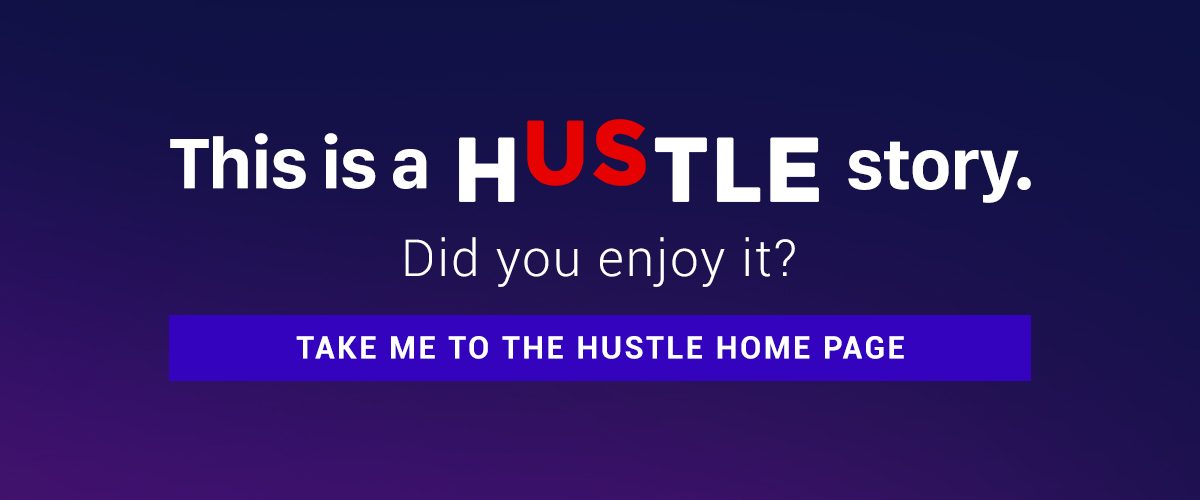





There are no comments yet. Add your comment to start the conversation.